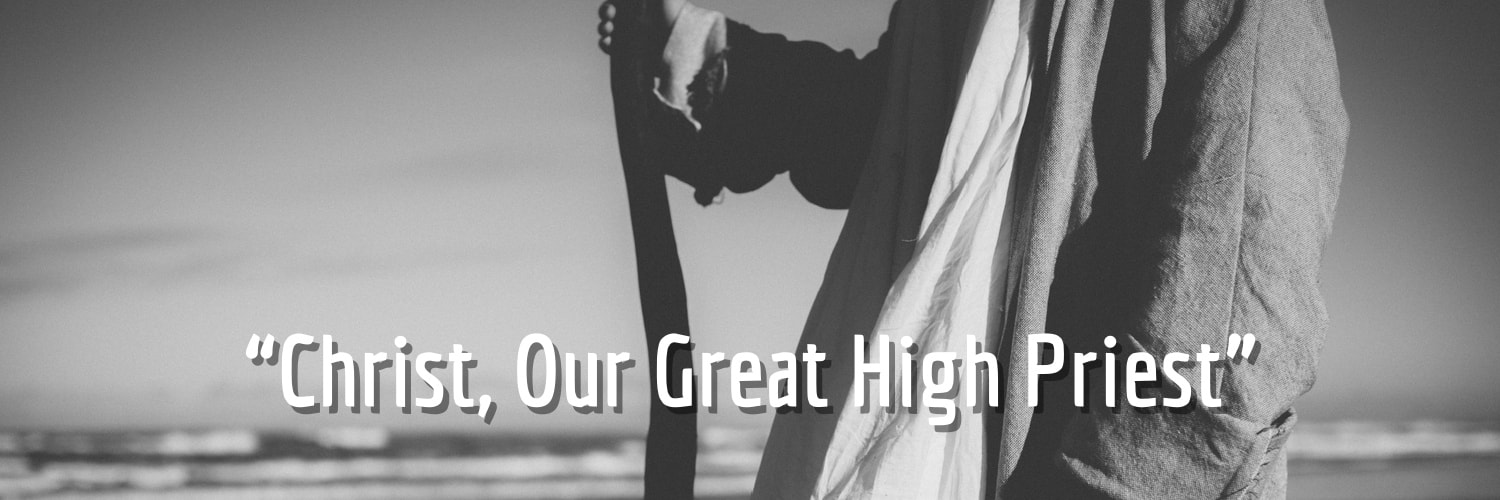|
How are we to understand the crucifixion and death of the Lord Jesus? What are we to understand him as doing? Unless we understand Jesus as our Great High Priest who is actively offering something to God on our behalf, we are going to miss altogether the significance of his work. In his duties in the tabernacle, the priest was a representative of the people he served. His task was to represent the people before the LORD, which is why the priests were to have the names of the tribes of Israel engraved on their priestly garments. In his office as a priest in the tabernacle, the priest would be the representative of the people of Israel, bearing their names upon himself as he would offer sacrifices (Exod 28:6-14; 39:6-7). Thus, the priest stood in the place of the people before the LORD. He ministered on their behalf, in their place, as their mediator. There is always a fundamental relation between the one who makes atonement and the one for whom atonement is made. 1 As it relates to Christ’s priestly office, several things deserve our attention. First, the death of Christ is an offering. He is offering himself to God as a sacrifice (Eph 5:2). He is a priest in service to God (Heb 2:17). His priestly work undoubtedly has effects on us, but it primarily needs to be seen as something he does in relation to God. Jesus is certainly the perfect Prophet and the perfect King as well, but these two offices have their primary concern in relation to the people of God. The prophet speaks to the people, the king rules and reigns over the people. The High Priest is in service to God himself. His offerings are directed to God. Second, Jesus as our Great High Priest is active in his priestly ministry. Sometimes Jesus is viewed as nothing more than a passive victim subjected to the whims and wishes of the angry mob. There is certainly an element here that needs to be appreciated. Jesus is being put to death by the hands of sinful men (Luke 24:7; Acts 2:23). But we also need to bear in mind that Christ himself has authority to lay his life down and authority to take it up again. No one takes it from him (John 10:18). Jesus was obedient “to the point of death, even death on a cross” (Phil 2:8). As our Great High Priest, the priestly ministry of Jesus is an active one and glorious one, as Hugh Martin eloquently states: If he died a mere passive victim, he did not die a victor: and no subsequent glory can in that case redeem what in that case was defeat. But he died a triumphant agent. He prevailed against death to live until he said, ‘Tis finished’, and then to die, not merely voluntarily, but by positive priestly action, giving himself to God. The cross itself is glorious; not from the subsequent resurrection and enthronement, but glorious from itself. It is itself a chariot of triumph. 2 Third, Jesus is our Great High Priest who offers something. In the Old Testament, the priests serving in the tabernacle, and later the temple, did not appear before God with empty hands. Their ministry was not a matter of personally influencing the Lord through their own holiness, but of offering something to the Lord on behalf of the sinful people in order to atone for their sins. Lambs, goats, and bulls were often used as sacrifices in order to remove the guilt of the people of Israel. If Jesus is our Great High Priest, he must actually offer something to God for the sins of the people. 3 And what does he offer? Jesus offers himself as the sacrifice to bear the wrath of God and to take away the guilt of his people. Jesus is both the High Priest and the sacrifice. Because the blood of bulls and goats could never truly take away sin, but only offer ceremonial cleanliness, Jesus must offer something better. He must serve God with a better sacrifice, with better blood. Jesus is the blameless and spotless Lamb of God who takes away the sin of the world (John 1:29). He is the Lamb who has been slain to save, by his blood, people from every tribe, tongue, and nation (Rev 5:9-12). Therefore, Christians can and should take great comfort and find great solace in Christ Jesus, our Great High Priest who saves his people from their sins. 1 Hugh Martin, The Atonement, Banner of Truth Publishing, 23. 2 Martin, 49. 3 Martin, 38. Scott Muilenburg is the pastor at First Christian Reformed Church in Edgerton, MN. He is a graduate of Westminster Theological Seminary in Philadelphia and is happily married to his wife, Becca. They have three young children.
Comments are closed.
|
Authors and Categories
All
|
About Renewal CastWe believe that our minds are to be shaped and renewed by the life-giving and transforming Word of God through the power of the Holy Spirit - so we pray that as you listen you will see Jesus more clearly.
|
Useful Links |
Stay Connected!We are always working on something new and exciting, so make sure to be the first to know!
|
© Copyright 2023. All Rights Reserved.

